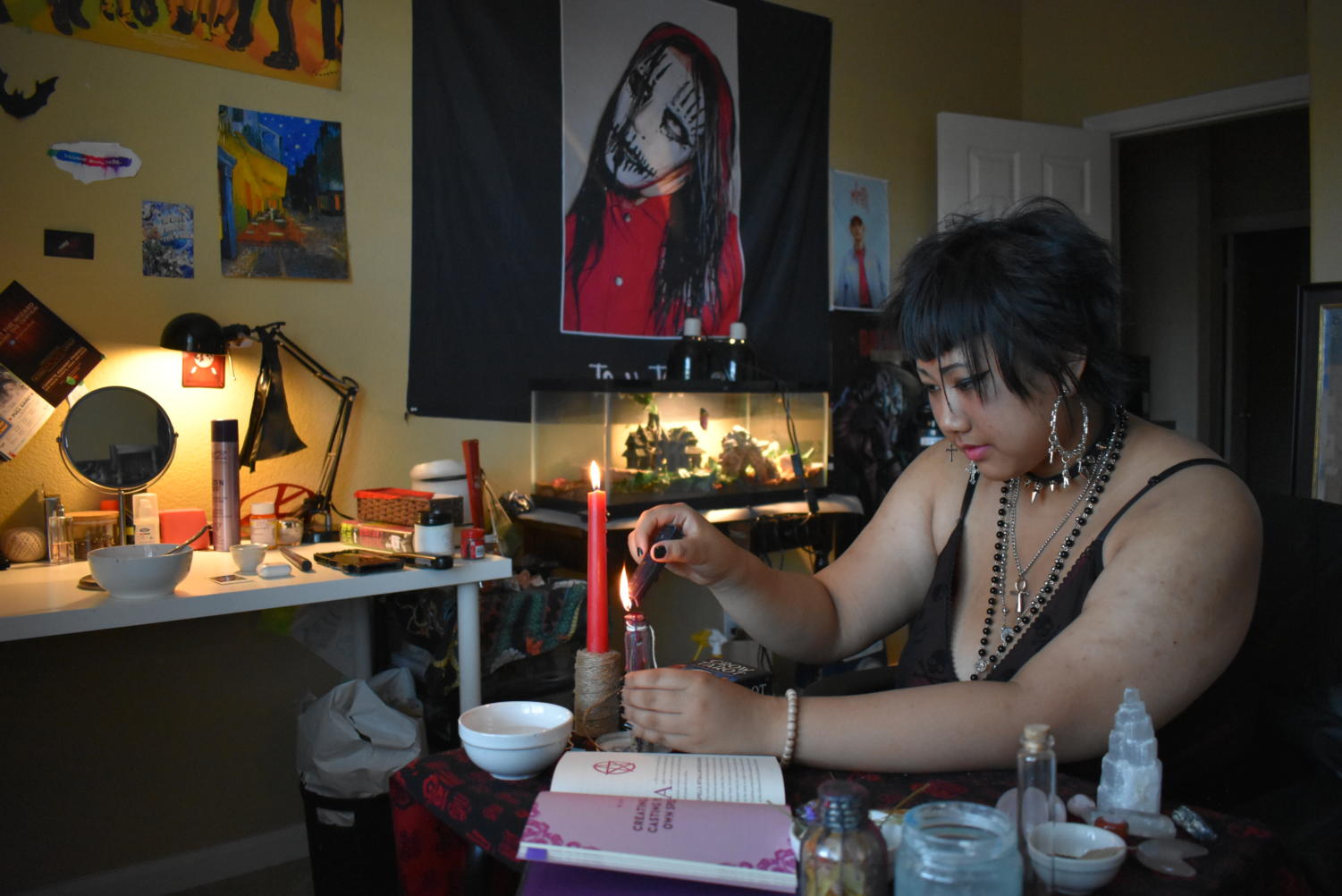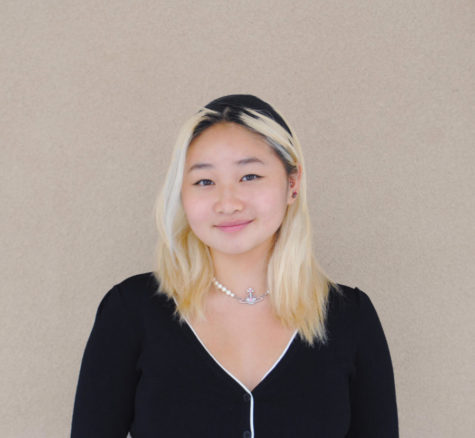Hubbard, Daniels practice witchcraft
November 19, 2021

In preparation for her protection spell, Kat Daniels (11) placed her mortar and pestle on her altar and set a few candles aflame. She sprinkled a dash of black pepper, star anise, and other herbs into the mortar. Clearing her mind and setting her intentions, Daniels ground the ingredients together. After shaking the contents into a jar, she plucked a strand of her hair and placed it in with the herbs, sealing the top with wax. Tying it to her window, the spell jar collected any bad energies entering her space, making Daniels feel safer.
Daniels began practicing Wicca witchcraft—a type of faith with Pagan and Folk roots that focuses on natural seasons and celebrations—only two months ago.
Her friends from school introduced her to the craft.
“As I observed people practicing witchcraft, I felt that these people were really grounded and really connected spiritually with the world around them and that really drew me in,” Daniels said. “Wicca is a broader practice that is easier for people to get into because there aren’t many specific rules to what you have to do. Some holidays I celebrate are the solstices, which are times when your energy is way more powerful.”
While Daniels was always open to the idea of spirituality, she never went out of her way to learn more about it before she began practicing.
“A friend gave me a crystal at the beginning of my journey, which caused me to start entertaining the idea of its legitimacy,” Daniels said. “Crystals essentially stimulate emotional, spiritual, and physical healing.”
According to Daniels, her mood lifted whenever she brought a few crystals to school. Intrigued, she visited a spirituality shop and bought a tarot deck. As she became more invested in Wicca, she began tarot reading, which is similar to fortune-telling, and making spell jars.
“I practice tarot almost every day to improve my skills,” Daniels said. “I have five tarot decks, one which I always keep in my bag in case anyone wants a reading. I also try to do one spell every single week to retain my knowledge on which herbs create which spells.”
Daniels, who hadn’t followed any religion or practice before Wicca, said she feels filled with purpose.
“After I got into witchcraft, there was something inside of me that felt less empty,” Daniels said. “I felt more fulfilled, having something I can rely on or hold onto to keep myself grounded. Wicca makes me feel like I have something I know is protecting me.”
For Daniels, Sydney Hubbard (12) was her most knowledgeable friend on witchcraft and introduced her to the practice.
Unlike Daniels, Hubbard is a folk practitioner. She works with her ancestors, focusing on connecting with her roots and learning the traditions of her family.
“I use my practice as a tool to help center myself but also to learn about problems my ancestors and family have and how I can change and grow,” Hubbard said.
Hubbard began practicing witchcraft during her sophomore year.
“I remember seeing a YouTube video of a girl showing off her tarot cards and I thought it was so cool,” Hubbard said. “I just loved the concept of interpreting and understanding energy around me with tarot.”
While Hubbard initially wanted to use witchcraft to protect her home, she learned more about the different kinds of witchcraft and felt attracted to folk magic.
Her practice involves honoring her ancestors, contacting spirits with tarot, and providing offerings to her family such as water and wine on special occasions.
“It felt like the safest way for me to feel like I could practice in a comfortable environment,” Hubbard said. “Folk magic is a lot older than other crafts and it’s different depending on who you are. I know somewhere in my ancestry, there is someone who is Pagan and for them to practice, they wouldn’t necessarily have the means to go out and buy a certain chalice or cup. They had to use what was around them so there’s a huge emphasis on learning how to use what’s around me.”
With many misconceptions about witchcraft thanks to mainstream media and debates on whether witchcraft is a secular practice or a religion, Hubbard said she believes she is more spiritual than religious.
“I don’t really see myself involved in an organized religion,” Hubbard said. “I think religion has a lot of expectations and a lot of doctrine around it, which is a box I don’t necessarily want to put myself in. When it comes to religion, whatever deity you believe in, your belief makes it real for you. I believe that all pantheons are real and that they can all coexist, even if I don’t necessarily work with any of them.”
While Hubbard puts a lot of trust into her practice, she says she has moments where she doubts her faith.
“Sometimes I question whether what I’m doing has any actual effect,” Hubbard said. “But, in the end, it just comes back to believing that I’ve grown as a person since I’ve started. Sometimes, I doubt—not often—whether I’m on the right path. I think if anything, witchcraft has helped to ease those fears.”
According to Hubbard, witchcraft is a commitment to continual self-improvement, as self-reflection and learning from the past play a big role in her practice.
“I dedicate my practice to self-growth and I think that is what witchcraft is,” Hubbard said. “It has helped me recognize and handle negative emotions more easily. I keep practicing because it is really comforting, knowing that I have an identity to grow into.”


